alexsl
In this article, I am going to compare the growth prospects, risks and valuations of the two largest e-Commerce companies on the planet: Alibaba (NYSE:BABA) and Amazon (AMZN). The shares of both e-Commerce companies have under-performed this year, in large part because of a post-pandemic slowdown in global economic growth and soaring inflation, which is impacting consumer spending. Both factors have created considerable uncertainty for the e-Commerce sector. With Alibaba’s and Amazon’s shares repricing 31% and 29% lower year to date, both companies have pros and cons. While Amazon has a couple of advantages, I believe Alibaba may be the better deal!
Top line growth is slowing
Both Alibaba and Amazon have seen a significant slowdown in top line growth in the last quarter as inflation headwinds and weaker economic growth after the pandemic impacted their businesses. Alibaba’s revenue growth slowed to 0% (Alibaba’s China commerce business actually declined 1% in FQ1’23), the worst performance on record for Alibaba, while Amazon’s top line growth slowed to just 7% year over year in Q2’22, reflecting a 20-year low point for Amazon.
Ycharts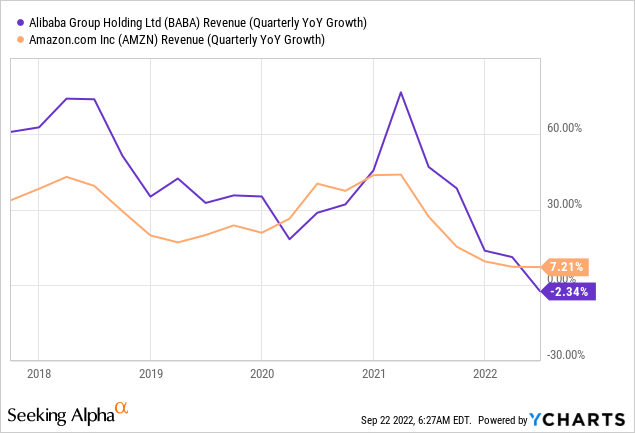
The near term outlook for revenue growth is stronger for Amazon than it is for Alibaba right now, largely because Amazon has said in its second-quarter earnings sheet that it sees between $125.0B and $130.0B in net revenues in Q3’22, implying a revenue growth rate of 13-17% year over year. Alibaba has not given a forecast either for the next quarter or the full-year due to uncertainty about e-Commerce sales in a country that is still seeing broad-scale COVID-19 lockdowns.
Regarding forward annual estimates, Amazon is expected to do better than Alibaba. Consensus forecasts call for Amazon to see revenue growth of 11% this year and 15% next year… while Alibaba is projected to grow its top line at rates of 2% and 13%. Estimates have also dropped more for Alibaba, indicating that the market is a bit more pessimistic about BABA than AMZN…
Ycharts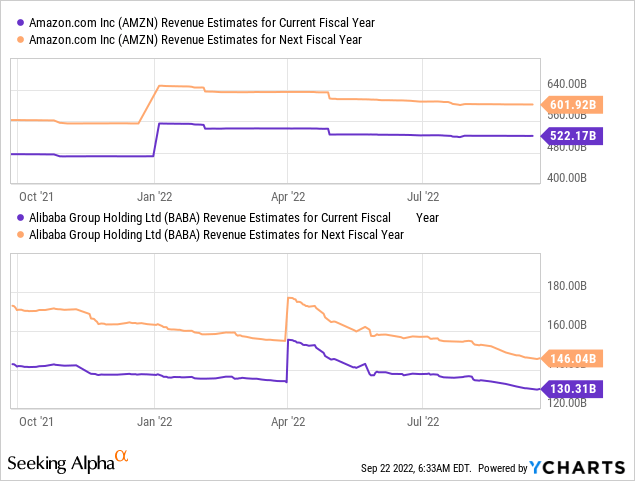
A key component that is driving Amazon’s stronger top line growth is AWS — Amazon Web Services — which is ramping up revenue growth rapidly due to strong customer adoption of Cloud solutions. Amazon Web Services generated $19.7B in revenues for the company just in the second-quarter, showing 33% year-over-year growth. The revenue share within Amazon was about 16%, and I see this share growing to more than 20% within the next 2-3 years. The Cloud business is by far Amazon’s highest potential business segment, and it is driving the firm’s entire revenue growth. As opposed to e-Commerce, AWS is also highly profitable, generating $5.7B in operating income (29% margin) while Amazon’s e-Commerce operations in North America and International continued to lose money in Q2’22.
Amazon: AWS Revenue/Operating Income Growth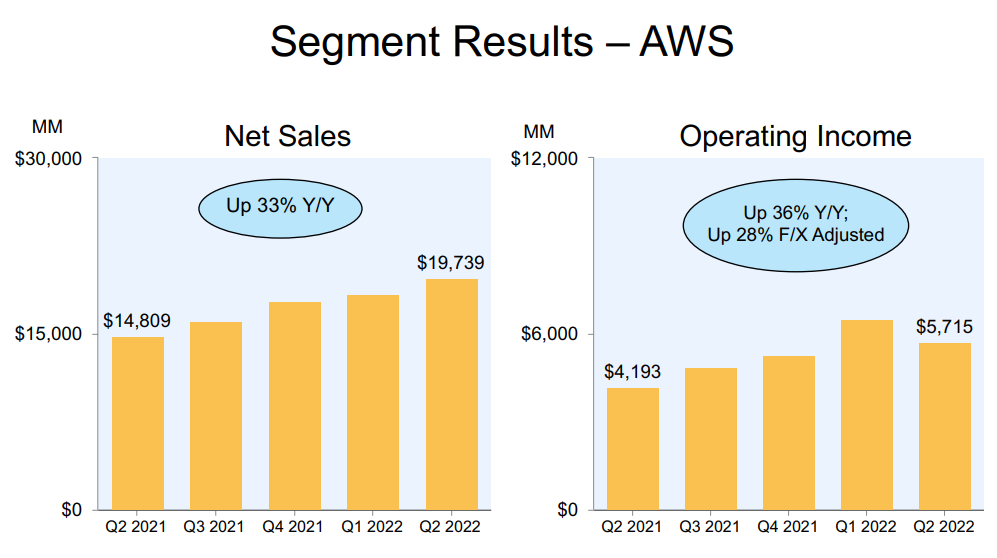
On the other hand, Alibaba’s Cloud business generated $17.7B Chinese Yuan ($2.6B) in revenues in the last quarter, showing a growth rate of 10% year over year. Cloud revenues represented just 9% of Alibaba’s total revenues, while the commerce business (China and International) dominated with a revenue share of 76%.
So not only is Amazon’s Cloud business responsible for most of Amazon’s top line growth, but AWS is also growing more than three times faster than Alibaba’s Cloud segment. On top of that, Amazon has a significant advantage regarding market share in the Cloud market, with AWS ranking #1 and capturing a third of the global Cloud market. Alibaba was ranked a fairly distant fourth with a market share of 5%.
Statista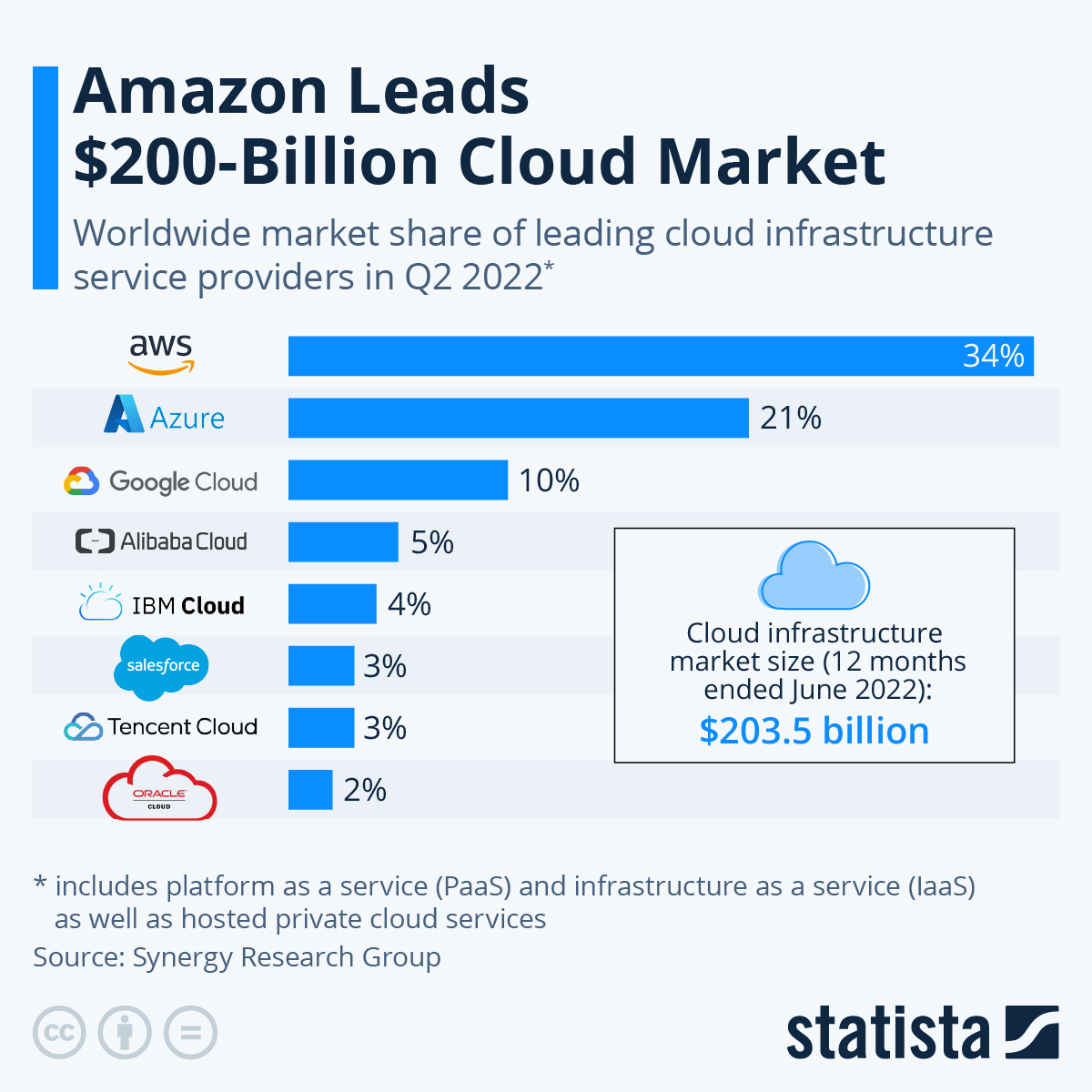
Valuation: key differences emerge
Amazon and Alibaba have both been highly valued during the pandemic because online retailers faced super attractive growth prospects at a time when the physical competition was all but taken out of the game by health authorities. The post-pandemic normalization of e-Commerce growth and the resulting re-rating of Amazon and Alibaba, however, have changed things up a bit.
Amazon and Alibaba are both profitable and are expected to remain profitable. But a key difference has emerged regarding the firms’ valuations. While Amazon is still expensive relative to its earnings potential (52 X P-E ratio), Alibaba is trading at a rock-bottom P-E ratio of 10 X… which represents stronger potential for an upside revaluation.
Ycharts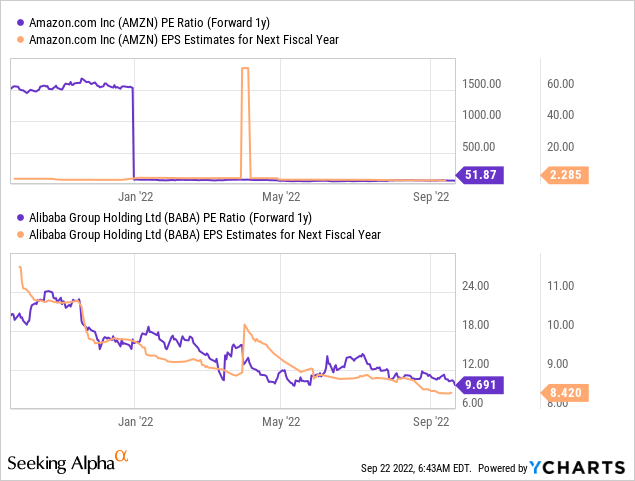
Risks with Alibaba and Amazon
Both companies are facing deteriorating prospects in their core e-Commerce operations due to high inflation, which is impacting consumer spending. Amazon and Alibaba are both highly dependent on consumer spending, and both companies continue to be dominated by their e-Commerce operations (Alibaba’s commerce share is 76% while Amazon’s is 84%).
Besides top line risks which both companies share, there are other more company-specific risks that matter: Amazon is generating a large number of sales outside the US, meaning the retailer has exposure to the appreciating US Dollar. A strong US Dollar hurts currency conversions, which is a headwind for Amazon.
For Alibaba, there are regulatory and delisting risks that are affecting the pricing of its shares. I believe that a delisting of Alibaba’s ADR from a US stock exchange is highly unlikely to occur because the firm secured a primary listing status for its shares in Hong Kong, which gives US investors an alternative marketplace to buy shares. Due to the primary listing status, Alibaba’s shares are also available for mainland Chinese investors through the Hong Kong stock connect program.
Final thoughts
When comparing Alibaba and Amazon, there are many factors that must be considered. Both companies obviously are going through a post-pandemic adjustment period of slowing growth. Both companies are investing in the Cloud market and are facing challenges in their core segments.
Amazon has a stronger short term revenue outlook than Alibaba as it projects 13-17% revenue growth in the third-quarter, while Alibaba may actually see negative revenue growth in FQ2’23. Estimate trends favor Amazon as well. From a valuation perspective, I believe Alibaba wins the comparison, however, because the Chinese company trades at a fraction of Amazon’s P-E ratio. The risk profile for Alibaba’s shares is therefore much more skewed to the upside than Amazon’s!


Be the first to comment